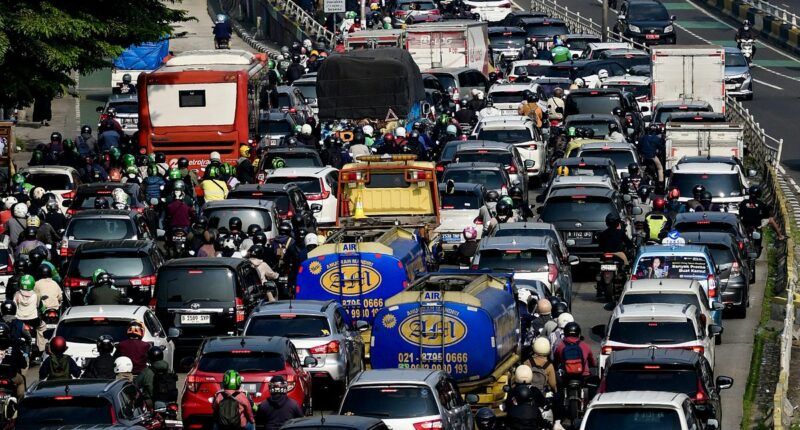Share this @internewscast.com
Jakarta has claimed the title of the world’s largest city, surpassing major urban centers despite facing significant challenges, including severe flooding, dire pollution, and notorious traffic congestion.
The Indonesian capital now boasts an estimated population of 42 million, outpacing both Dhaka, Bangladesh, and Tokyo, Japan, as detailed in the United Nations’ latest urbanization report.
Known affectionately by locals as “The Big Durian,” Jakarta has experienced a dramatic population increase since the last ranking in 2018, when Tokyo held the top spot and Jakarta was ranked 33rd.
The UN’s World Urbanization Prospects 2025 report highlights that Jakarta’s population has been expanding at an average rate of nearly 2% annually since the year 2000.
As the economic hub of Indonesia, Jakarta plays a crucial role in the nation’s prosperity, contributing almost 20% to the country’s Gross Domestic Product (GDP), and solidifying its status as a key player in Southeast Asia’s vibrant economy.

Residents wade floods at the residential areas in East Jakarta, on February 19, 2021

A traffic jam on a main road leading into the city centre of Jakarta on May 8, 2024

A general view of Jakarta’s skyline on December 21, 2023

Rescuers evacuate residents from their flooded homes in Bekasi on February 19, 2021, as heavy rain inundated the city on the outskirts of Jakarta

Heavy traffic during the morning commute in Jakarta, Indonesia, on February 27, 2024

People stand on a transparent-floor deck of an observatory claimed to be Indonesia’s highest, at the Thamrin Nine building in Jakarta on July 24, 2025

A view of piles of garbage polluting Muara Baru port in Jakarta, Indonesia, on May 22, 2023

A family rides on a motor scooter in Jakarta on November 8, 2025

Online motorcycle taxi drivers line up while waiting for customers in front of Plaza Indonesia mall in Jakarta, Indonesia, on June 11, 2025
It is the beating heart of Indonesia, one of the wealthiest economies in southeast Asia, making up nearly one-fifth of the entire country’s GDP.
With much of its economy made up of service and manufacturing sectors including banking, trading, finance, as well as the production of electronics, automotive, chemicals, mechanical parts, and biomedicine, business in the city has long been booming.
But there are still deep faults and problems that threaten to tear Jakarta apart in the long term.
For one, it has an elevation above sea level of just 36ft. For comparison, London sits 78ft above sea level.
And the British capital doesn’t directly face the Java Sea, nor is it deluged every year by a torrential rainy season that floods huge swathes of the city and threaten the health of its residents.

Commuters’ scooters are parked at a train station in Tangerang, Greater Jakarta, on July 22, 2025

An aerial view shows people gathering at Sudirman Street during Car Free Night to celebrate New Year’s Eve in Jakarta, Indonesia on January 1, 2024

A street performer speaks to a child on a motor scooter in Jakarta on November 8, 2025

Children buy toys piled high on a bicycle next to a seawall in Cilincing, North Jakarta, on September 20, 2025

A fish vendor reaches into a tank to catch a fish for a customer at a roadside stall in Jakarta on November 8, 2025

Elderly people finish their daily 40-minute swim at sea in the early morning in Jakarta on November 18, 2025

A man pedals a modified cargo tricycle loaded with goods on a street in Jakarta on May 4, 2025

A mother poses as she soothes her two-month-old daughter placed in a baby bouncer next to a kiosk in Cilincing, North Jakarta, on November 5, 2025

People take part in a free Zumba dance workshop on a street during Car Free Day in Jakarta on August 24, 2025
Jakarta’s north, the side that faces the sea, is particularly prone to frequent flooding, while the city as a whole is considered one of the fastest sinking in the world, with some parts sinking up to 12 inches every single year.
These structural problems, coupled with the ever-growing population, have led successive Indonesian governments to push for the removal of Jakarta’s status as the country’s capital city.
The new capital, Nusantara, has been under construction since 2022 following a declaration by then-president Joko Widodo.
But the project, set to be completed by 2045, has seen a series of setbacks including construction delays, a lack of foreign investment and issues with management and land.
For now, then, The Big Durian remains the powerhouse of Indonesia’s economy.

















